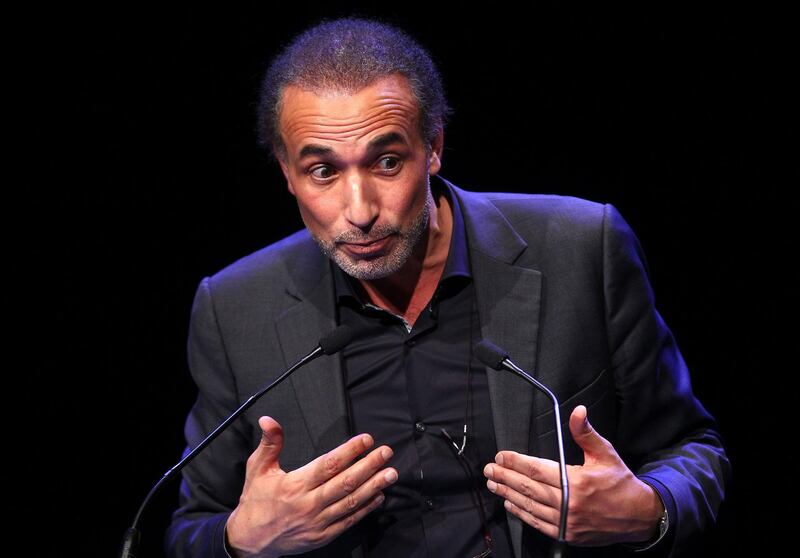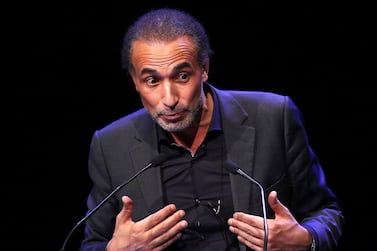As tens of thousands of people attended the annual congress of a French Muslim organisation, the name of a controversial absentee was in many thoughts.
Tariq Ramadan, the Swiss academic accused of two rapes but vehemently protesting his innocence, has been a prominent speaker at previous gatherings of what is now Muslims of France (MF) but was previously known as UIOF, the Union of Muslim Organisations in France.
Mr Ramadan, 56, is married with four children. The French newspaper Liberation suggested that his "double life" – admission to consensual extra-marital affairs – has led MF to distance itself from him.
But some of those who visited the four-day congress clearly missed his presence. "His thinking has left a mark on all of us," one former UOIF activist told Liberation. "I'm putting things in perspective," said a young woman. "On one side there are the accusations. But if he came to give a lecture, I think I would attend."
The event at Le Bourget coincided with sensitive times for French Muslims.
One speaker at the MF congress, Hakim El Karoui, a Franco-Tunisian banker turned author, has launched the Muslim Association for a French Islam (AMIF) with the aim of achieving the “serene integration of Islam in France”.
This, he argues, should involve a willingness to embrace France’s republican principles and reject the narrative of Salafists and the Muslim Brotherhood.
He remained calm when challenged by Marwan Muhammad, a controversial Muslim activist who formerly acted as spokesman for a French anti-Islamophobia group. But he struggled to make himself heard.
Mr Muhammad - described by the news magazine Marianne as a "fiery intellectual, friend of Salafist imams and hostile towards his progressive co-religionists" – was cheered by supporters as he dominated the exchanges.
But the event attracted relatively little mainstream media attention and even Liberation reported a relatively sparse attendance, probably fewer than the 70,000 estimated last year. Its reporter said Mr Muhammad – known as a supporter of Mr Ramadan – failed to attract a large audience to a "round table" discussion on "his favourite theme of the inclusion of Muslims in French society".
While MF has been careful to assert its independence, its predecessor was seen as the French branch of the Muslim Brotherhood, which is considered a terrorist organisation by the UAE and other countries.
A newly published book by the French investigative journalists Georges Malbrunot and Christian Chesnot claims that Mr Ramadan, the grandson of the Egyptian founder of the Muslim Brotherhood, has been the recipient of generous payments from Qatar.
According to the book, Qatar Paper - How the emirate finances Islam in France and Europe, Mr Ramadan was paid €35,000 a month (Dh144,000) as a consultant to the Qatar Foundation, a body set up by Sheikha Moza bint Nasser, the wife of the last emir, Sheikh Hamad bin Khalifa Al Thani, and withdrew €590,000 from Qatari bank accounts before his arrest last year.
Mr Ramadan, who was granted leave of absence from his post as professor of modern Islamic studies at Oxford University to concentrate on defending his case, was not formally invited to the MF congress at Le Bourget exhibition centre north-east of Paris. But officials told French media he had every right to attend on a personal basis.
Released on bail last November after nine months in custody, he attracted controversy when he accompanied his daughter Maryam to an event on violence against women in a Parisian suburb of Saint Denis. The town hall, which organised the meeting, described his presence as a "provocation".
The French president Emmanuel Macron has yet again postponed his long-delayed initiative on reforming the organisation of Islam in France.
Mr Macron is now said to be awaiting next month’s elections for the European parliament, the outcome of which will be seen as the country’s judgement on his handling of six months of unrest caused by the “yellow vest” protests.
Muslims are divided on how the president should proceed. But there is overwhelming acceptance that the French Muslim Council (CFCM), set up by Nicolas Sarkozy, then interior minister and later president, is artificial and unrepresentative.
As the four-day event at Le Bourget closed, one lasting impression was that it had lacked some of its past appeal, not least because of the absence of it is former “headliner’.
Mr Ramadan continues to insist he is guilty of no wrongdoing. His lawyer, Emmanuel Marsigny, said recently on French television that he had urged Paris prosecutors to rectify "false information" circulating in the media. He said the presumption of innocence must be respected.
But one of the academic's accusers, Henda Ayari, told The National last year that those sympathising with him "may regret their support" if a court found he treated her as she claims.







